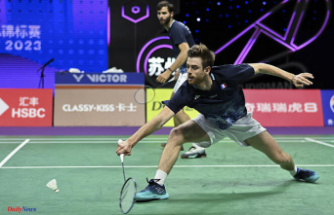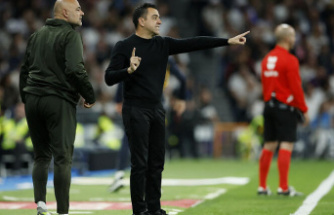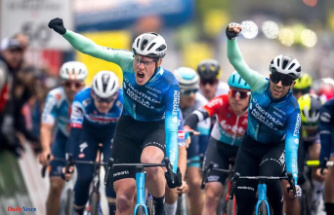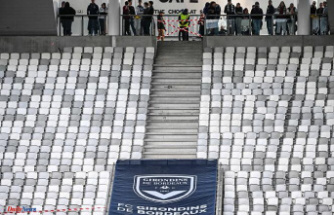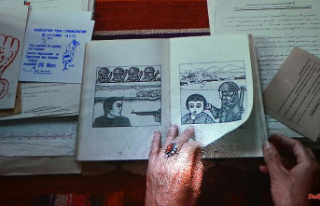The German Athletics Association returned from the World Championships with two medals, and the record has never been worse. Although Gina Lückenkemper wins a medal, she is still asked how she deals with the criticism. She finds many words, which in turn are to be understood as criticism of the DLV.
Gina Lückenkemper is not only one of the fastest sprinters in Europe, the 25-year-old is also a strong-minded athlete. At the World Championships in Eugene, she provided one of the very few moments of success from a German perspective when she won the bronze medal in the 4x100 meter relay together with Tatjana Pinto, Alexandra Burghardt and Rebekka Haase in 42.03 seconds. One of only two top three finishes for the German Athletics Association, which is the worst World Cup result in its history and, in the person of head national coach Annett Stein and general director Idriss Gonschinska, has repeatedly announced that it will subject this massive disappointment to a "relentless analysis". .
An analysis for which Lückenkemper provides initial approaches via her Instagram account - which can also be read as harsh criticism of the DLV. She regularly organizes question and answer sessions on the platform. Where she keeps her medals from major championships (in a display case in the dining room), why she is not used as a final runner (because she is better off in the curve), with whom she shared the room in Eugene (with Rebekka Haase) - and how the athletes actually deal with the criticism of the disastrous German performance in the world title fights.
"Very difficult topic," Lückenkemper introduces her detailed answer, which ends up covering 28 lines in four blocks of text, taking up almost the entire screen and ending with the meaningful words "Find the error...". In it, the reigning Vice European Champion over 100 meters criticizes that there is "no real support system" in Germany, "but rather a reward system". Those who have already "arrived at the top of their sport will be promoted". The self-asked question of how he (or she) gets there is answered by Lückenkemper with an emoji that shrugs. Freely translated: There is money for those who are successful. There is therefore no help on the way to success.
The athlete from SCC Berlin, who reached the semi-finals at the U20 World Championships as a 15-year-old and entered the big stage at the 2015 World Cup in Beijing as an 18-year-old, sees "a huge problem". Because there are "many talents in Germany", but "not every family has the financial means to support the children's sporting careers in the way that is necessary for a successful start in top-class sport." She makes this clear with an example that is to be understood as clear criticism of the German Athletics Association.
"For a mandatory relay event this year," says Lückenkemper, "the athletes were not paid for fuel or travel expenses, nor for all catering over the few days". This should be June 1st to 5th in Regensburg, the DLV lists this period explicitly in its publicly accessible nomination guidelines. In front of it it says unmistakably: "Participation in the following central relay measures is binding for the respective invited athletes and a nomination requirement." Means: Anyone who is invited by the national coaches and doesn't come shouldn't have a chance to start at the World Cup in Eugene and the European Championships at home in Munich (15th to 21st August).
According to Lückenkemper, "both the youth and the active squadrons had to be present" for this relay measure, which can also be understood as a management course. A large meeting, which was embedded in the course, took place in Regensburg on June 3rd and 4th. One of the few big competitions that still exist in Germany. A look at the result list shows that there were a large number of athletes at the start who represented the DLV at the World Cup or will be represented at the U20 World Cup in Cali, Colombia next week.
"This measure was a top-up business for the athletes," says Lückenkemper, clearly explaining that the bottom line is that it costs money to want to recommend yourself for international championships. And this despite the fact that the DLV presents non-participation as an exclusion criterion. "And many of the youngsters in particular cannot afford that," says Lückenkemper, especially since the DLV expects top performance despite these circumstances that are worthy of criticism. And in fact it seems strange that an association apparently invites you bindingly without paying for the journey.
At the end of her criticism, the 25-year-old, who has become the face of German athletics with her open nature in recent years, then becomes a little more general. "Most track and field athletes in Germany," she writes, "work alongside their sport to finance themselves, or they're studying at the same time." This is confirmed by looking at the official DLV team brochure for the World Cup in Eugene. Relay colleague Alexandra Burghardt, who won the silver medal at the Olympic Winter Games as a bobsleigh brakewoman from Mariama Jamanka, is studying culture and economics, Rebekka Haase is studying psychology, and Tatjana Pinto is studying social work. For Lückenkemper, the Profession field says: Student (business psychology).
The number of full professionals is negligible, and yet, writes the exceptional sprinter, "our society expects semi-professionals to be able to keep up with the full professionals, no, even to defeat them". Then she concludes the detailed answer to the obvious question with the implicit request to find the error in all these things. On the one hand, on a large scale, in the question of whether and how a society would like to promote top-class sport - and on a small scale, as the German Athletics Association is apparently failing to create reasonable framework conditions for its figureheads.


